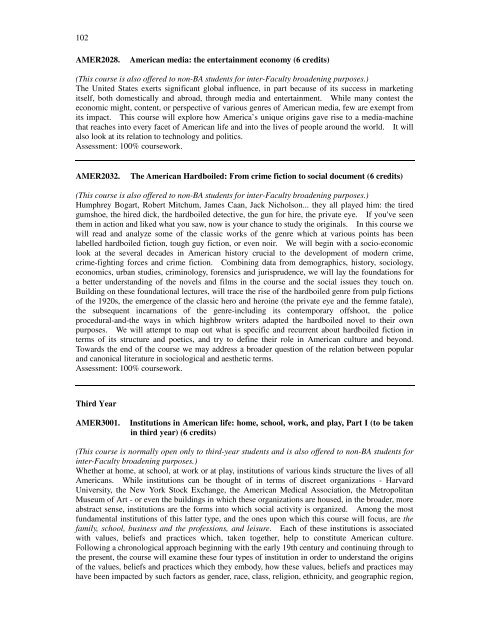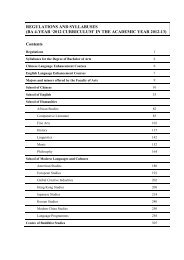Bachelor of Arts (BA) - The University of Hong Kong
Bachelor of Arts (BA) - The University of Hong Kong
Bachelor of Arts (BA) - The University of Hong Kong
Create successful ePaper yourself
Turn your PDF publications into a flip-book with our unique Google optimized e-Paper software.
102<br />
AMER2028.<br />
American media: the entertainment economy (6 credits)<br />
(This course is also <strong>of</strong>fered to non-<strong>BA</strong> students for inter-Faculty broadening purposes.)<br />
<strong>The</strong> United States exerts significant global influence, in part because <strong>of</strong> its success in marketing<br />
itself, both domestically and abroad, through media and entertainment. While many contest the<br />
economic might, content, or perspective <strong>of</strong> various genres <strong>of</strong> American media, few are exempt from<br />
its impact. This course will explore how America’s unique origins gave rise to a media-machine<br />
that reaches into every facet <strong>of</strong> American life and into the lives <strong>of</strong> people around the world. It will<br />
also look at its relation to technology and politics.<br />
Assessment: 100% coursework.<br />
AMER2032.<br />
<strong>The</strong> American Hardboiled: From crime fiction to social document (6 credits)<br />
(This course is also <strong>of</strong>fered to non-<strong>BA</strong> students for inter-Faculty broadening purposes.)<br />
Humphrey Bogart, Robert Mitchum, James Caan, Jack Nicholson... they all played him: the tired<br />
gumshoe, the hired dick, the hardboiled detective, the gun for hire, the private eye. If you've seen<br />
them in action and liked what you saw, now is your chance to study the originals. In this course we<br />
will read and analyze some <strong>of</strong> the classic works <strong>of</strong> the genre which at various points has been<br />
labelled hardboiled fiction, tough guy fiction, or even noir. We will begin with a socio-economic<br />
look at the several decades in American history crucial to the development <strong>of</strong> modern crime,<br />
crime-fighting forces and crime fiction. Combining data from demographics, history, sociology,<br />
economics, urban studies, criminology, forensics and jurisprudence, we will lay the foundations for<br />
a better understanding <strong>of</strong> the novels and films in the course and the social issues they touch on.<br />
Building on these foundational lectures, will trace the rise <strong>of</strong> the hardboiled genre from pulp fictions<br />
<strong>of</strong> the 1920s, the emergence <strong>of</strong> the classic hero and heroine (the private eye and the femme fatale),<br />
the subsequent incarnations <strong>of</strong> the genre-including its contemporary <strong>of</strong>fshoot, the police<br />
procedural-and-the ways in which highbrow writers adapted the hardboiled novel to their own<br />
purposes. We will attempt to map out what is specific and recurrent about hardboiled fiction in<br />
terms <strong>of</strong> its structure and poetics, and try to define their role in American culture and beyond.<br />
Towards the end <strong>of</strong> the course we may address a broader question <strong>of</strong> the relation between popular<br />
and canonical literature in sociological and aesthetic terms.<br />
Assessment: 100% coursework.<br />
Third Year<br />
AMER3001.<br />
Institutions in American life: home, school, work, and play, Part I (to be taken<br />
in third year) (6 credits)<br />
(This course is normally open only to third-year students and is also <strong>of</strong>fered to non-<strong>BA</strong> students for<br />
inter-Faculty broadening purposes.)<br />
Whether at home, at school, at work or at play, institutions <strong>of</strong> various kinds structure the lives <strong>of</strong> all<br />
Americans. While institutions can be thought <strong>of</strong> in terms <strong>of</strong> discreet organizations - Harvard<br />
<strong>University</strong>, the New York Stock Exchange, the American Medical Association, the Metropolitan<br />
Museum <strong>of</strong> Art - or even the buildings in which these organizations are housed, in the broader, more<br />
abstract sense, institutions are the forms into which social activity is organized. Among the most<br />
fundamental institutions <strong>of</strong> this latter type, and the ones upon which this course will focus, are the<br />
family, school, business and the pr<strong>of</strong>essions, and leisure. Each <strong>of</strong> these institutions is associated<br />
with values, beliefs and practices which, taken together, help to constitute American culture.<br />
Following a chronological approach beginning with the early 19th century and continuing through to<br />
the present, the course will examine these four types <strong>of</strong> institution in order to understand the origins<br />
<strong>of</strong> the values, beliefs and practices which they embody, how these values, beliefs and practices may<br />
have been impacted by such factors as gender, race, class, religion, ethnicity, and geographic region,
















